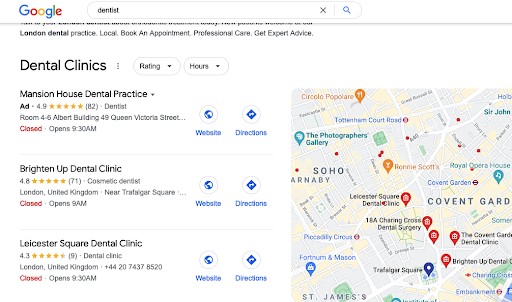In the SEO world, it’s a saying that half of the SEO work is done if you can find the most relevant keyword for your business.
Keyword research is a vital part of SEO. You have to find the most suitable keywords which have enough search volume. Keyword research also has the upper hand, as in the case of Local SEO.
Do you wish to know how to do keyword research for local SEO optimization?
What is Local SEO?
Local SEO aims to get an online identity for local inquiries. This process also helps to improve the website rank both in organic search and in Google My Business.
Google My Business is integral to a local search strategy that must be optimized. But there is a misunderstanding that local SEO is equal to GMB, it is not the be-all and end-all of local search.
Why Local SEO is Important?
Local SEO is essential if your business has a physical location or multiple locations. If your customer base is predominantly based on your business’s city or area, it is necessary.
Do you know whether your business needs a local SEO strategy? Do you know how to find it?
It’s very easy to find.
You can make the search as a customer for your products in the search engine. You can type probable keywords customers may use to find your products and/or services.
What is your finding?
If you notice that the results are more localized based on where you’re looking, you’ll need local SEO.
Also, Read Magento SEO & Shopify SEO.
Implicit vs. Explicit Keywords
The Key difference between implicit and explicit keywords is; explicit keyword has the local intent specified upfront while implicit keywords are queries that do have local intent specified but implied.
Let’s understand this with an example.
Let’s say you are based in Trafalgar Square, London. You are looking for a dentist, if you just search the keyword “dentist” without specifying a location, Google will understand the implicit intent that you are looking for a dentist, and a local dentist can best serve your query; so here is how the search results would look like.

If you repeat the same query with “dentist in Trafalgar Square”, the local intent is explicit, and you will get the results from Trafalgar Square.
Why Is Local SEO Keyword Research Important?
You’ll need proper keywords to help to reach the business goals easily without taking much time. Probably you may know your customers. But you can not avoid your online identity in this digital era. People are more online and gather information from there. You can reach your destination faster if you do the Local SEO work properly.
Find the best local SEO tools.
How to do local SEO
You can follow these steps to do proper Keyword Research.
- Understand
You must understand your or your client’s business first. To do this, ask them to list their services in detail. You should have a clear idea about the targeted audience and locality. It would be best if you had a proper strategy for keyword research. You can ask for an initial list of keywords from your client, which may help you find more relevant keywords later.
- Prepare
You can prepare an initial list of keywords from your understanding. You can depend on keyword research tools to get the search volume of the keywords.
You can consider the most important business keywords. The primary keywords to target for most local businesses will be self-evident. It will be your primary service/product, as well as your primary location.
- Modifiers
Modifiers are words added to your keywords because they are more appealing. These words change the keyword’s intent and increase your clickthrough rate. Users commonly use modifiers while searching.
Best, Quick, Free, Cheap, Where, Top, How, Purchase, etc., are some examples of commonly employed modifiers. You can also include industry-specific modifiers. If you have a gift shop, then wedding, birthday, and delivery are essential keyword modifiers for your business.
- Locality
You can include keywords that are relevant to your locality. The local aspect is the final step in finding keywords for your local SEO plan. You can take advantage of your company’s geographic location, the locations it serves, or the areas where your target market lives and works.
You can create location-specific landing pages and include countries, cities, and districts in your meta tags and on-page content to deliver relevant content for local searches.
You can also use these local keywords in blog articles and on social media to improve your relationship with the places you are targeting.
You can also place the service in strategic spots. Make sure your metadata has KEYWORD + LOCATION. For instance, coffee shops in Birmingham, gift shops in Porthleven, dental care in Liverpool, an event management company in Cambridge, etc.You can depend on your search engine; for example, you can use Google Autocomplete to complete your search. And you can type your primary keywords into Google and note the suggestions that appear.
- Competitors
You can keep an eye on your rivals. It’s always a good idea to look at what your competitors are doing. You can analyze their activities and then try to improve on them.
How to Determine Local Keyword Intent?
Local SEO helps those who are searching for local services. It ranks keywords with local intent. You can type the local intent keyword on Google if you live in the same area as your business. Google uses your location to provide personalized results.
You can determine the local keyword intent by checking the SERP for two things:
- A ‘map pack’
- Local businesses ranking in the organic results.
For example, if you are searching for the keyword ”gift shop” and get a map pack and a few local businesses in the search results. It is because this keyword has local intent. If you find keywords without local intent you can list them for next-level keyword research.
How to deal with multiple locations?
Maybe you have multiple offices or stores in different locations. There’s usually no need to repeat the complete process above for each location. All you have to do now is put the locations on your website. You can list all your locations if you have only a few.
Revisiting Your Local Keyword Research
Keyword research for local SEO is not a one-time process. Timely updates are an integral part of SEO. So you have to go over your keywords again in a gap of at least 6 months. You can find new keywords that are more relevant to your niche, and you didn’t notice before.
You can check that your keyword approach is working and make necessary modifications by monitoring your keyword positions on Google Maps based on a user’s location.
Local SEO Strategies for 2024?
There is no shortcut to rank your site rather than consistently working and optimizing your website. You can have a look at these crucial factors to improve your Local SEO.
Google My Business
Google My Business is a service provided by Google. You should appropriately fill out all of the fields in your GMB listing. Do you know How to Set Up Your Google My Business Listing? If not, please click this link.
Reviews
You can make a review-building strategy if you haven’t already. Reviews directly impact GMB rankings and are an excellent way to convert prospects into paying customers.
You should collect reviews on your Google My Business listing, but you should also think about integrating Facebook and other third-party platforms. The other third party should be a website that ranks your keywords, and this is known as barnacle SEO.
Citations
Citations, you may have heard, are useless! Local citations are still going strong! Yes, citations can be built, even if their impact on rankings has faded over time. You can only use the greatest data aggregators and tier-1 citation sources. It is, nevertheless, a good idea if you wish to make more!
Site Speed
Make sure your site is fast. Look at your Core Web Vitals report in Google Search Console if you have URLs that are weak or need to be improved.
On-page SEO
Internal links are frequently underutilized. Internal links with the anchor text ‘read more’ are prevalent, and the homepage distributes the greatest link equity to child pages. That anchor provides no context to a search bot. You should have well-organized data. When implemented, the FAQ schema can provide you with more space.
Link Building
Links will boost both Google Maps and local organic results. Not all links are created equal. Instead of merely “building all the connections,” have you considered looking at your local link benchmark?
You can compare your links to those of your competitors. The different categories of links include Citation, Topical, Local, Other, and Garbage. Find out what your benchmark is and start working on it. Stop relying on third-party link metrics to judge whether or not a link is beneficial. Go for it if the website is relevant regionally or topically and isn’t spammy.



